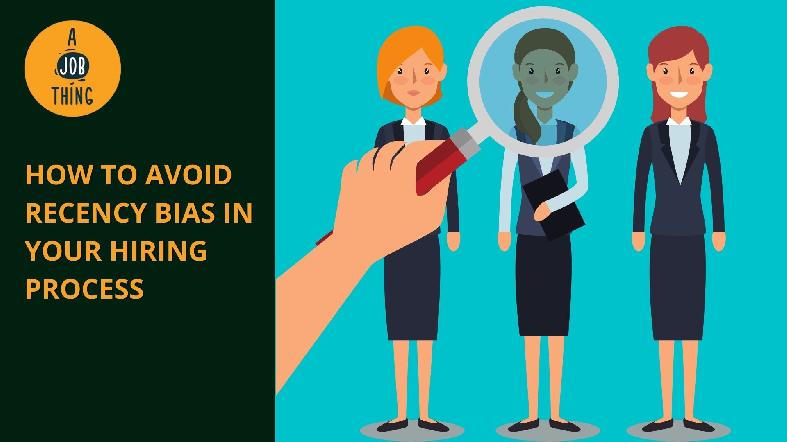
How to Avoid the Recency Effect in Your Hiring Process
Create Job Description Using AI
Write appealing job descriptions for any job opening to attract the most qualifield and suitable candidates. FOR FREE.
try now
The recency effect displays how our brains are programmed to recall information that was shown to us most recently.
The effect this train of thought can have on a hiring manager can be effective, such as falling into the trap of having better recollections of the last applicant interviewed instead of those in the top or middle of the interviewing list.
If left unchecked, the recency effect or bias may cause your organisation to miss out on the ideal candidate for the job.
This article discusses why hiring managers should be aware of the recency effect and what they can do to reduce its impact on hiring decisions.
The dangers of the recency effect
If you're still not sure of the recency effect's impact, have a coworker read you a list of words aloud, then try to repeat back the words you remember. Due to the primacy effect, you're likely to remember at least some of the initial words you heard, but most words you recall are likely to be those at the end of the list, the ones you heard last.
The recency effect is benign in most situations. However, for hiring managers who are conducting job interviews, it can influence which candidates are top of mind for the position.
On any given day, a recruiting manager could interview many applicants. At the end of the day, faces become blurry, names fade, and each applicant can seem to merge with the next. Individuals may find it difficult to stand out. That is when you are most likely to fall victim to the recency effect, which favours candidates near the end of the interview process.
The problem is that the best candidate for the job may be someone you interacted with early in the process. It could also be a candidate you meet somewhere around the halfway point. However, they are the applicants most hiring managers are most likely to overlook.
Getting around the recency effect
An excellent place to start is being aware of this potential unconscious bias and how it can affect your hiring decision. When you are aware of the recency effect's existence, you are likely to be much more sensitive to the possibility of succumbing to it, which is a good thing. However, that is not the only way to proceed.
Here are three simple methods you can use when hiring your next employee:
Create a transparent system
Having a strategy in place can assist you in staying alert to the recency effect.
A clear set of interview questions is the foundation of an effective system. Before beginning the interview process, back these questions up with a clearly defined interview structure. Consistent questions and a standard framework, when combined, will ensure that every candidate gets the same interview experience. In other words, you are levelling the playing field.
After that, create a set of evaluation criteria based on the information and replies you gathered from the candidates. It is worthwhile to devote effort in this area because when every candidate is rated using consistent criteria, your interview notes will be a critical tool in overcoming the recency effect.
Make time for taking notes
Allow some time at the end of the interview to finalise your scores and take relevant notes on each candidate. Keeping accurate notes is essential for remembering what was said and accurately assessing each candidate based on their answers and accomplishments.
The important thing is to take these notes while the prospect is still fresh in your mind. Don't put this off until later, when your memories may start to get hazy.
Avoid mental exhaustion
For hiring managers, the interview process can be mentally draining. This increases the possibility of unconscious bias taking over. A tired mind makes it easy to recollect the last candidates you spoke with and tougher to recall candidates you spoke with earlier.
Allow sufficient time for breaks between interviews to keep your mind sharp. Taking a pause, ideally, one in which you get up and move about, can help your brain to form new associations for specific candidates ("Ahmad Jamil? Yes, I chitchatted with him shortly before getting a drink in the morning").
Taking steps to eliminate or minimise the recency effect can go a long way toward ensuring your organisation hires the personnel that is best suited for the job and the company.
Source: Robert Half





